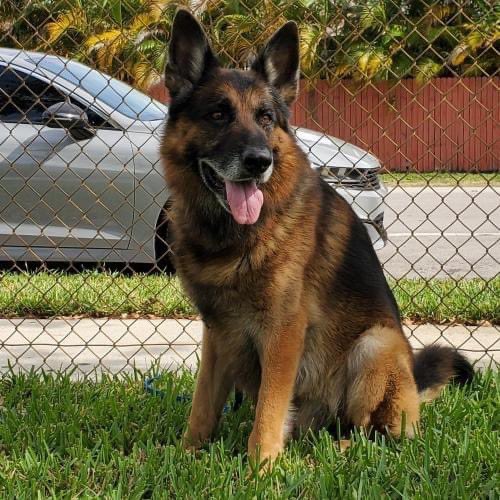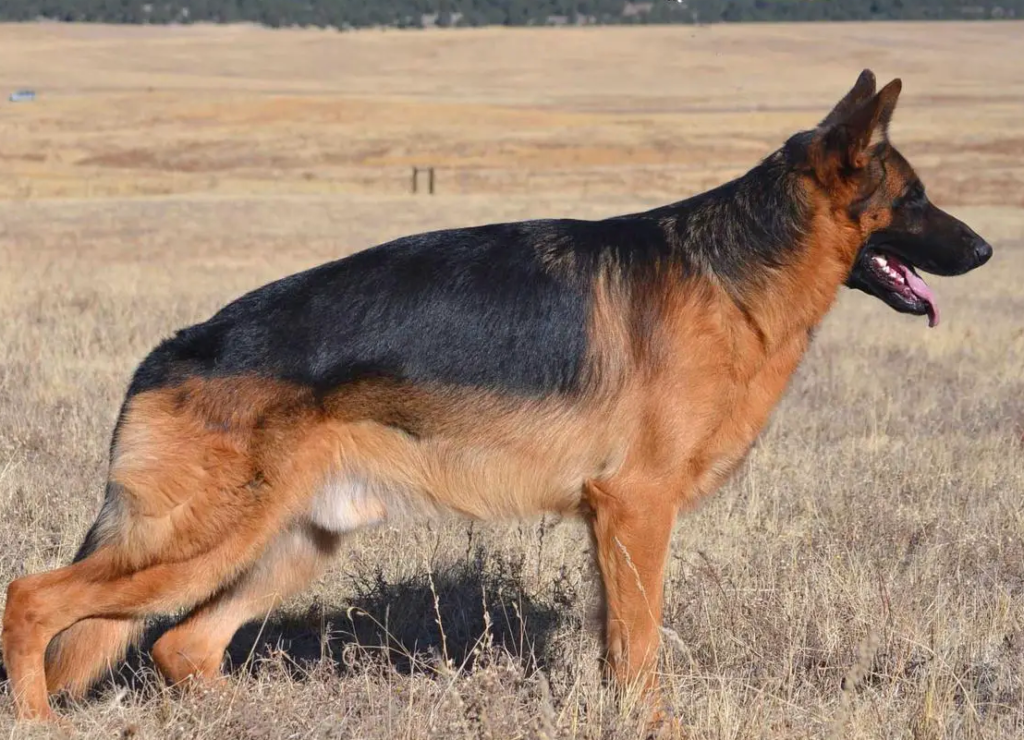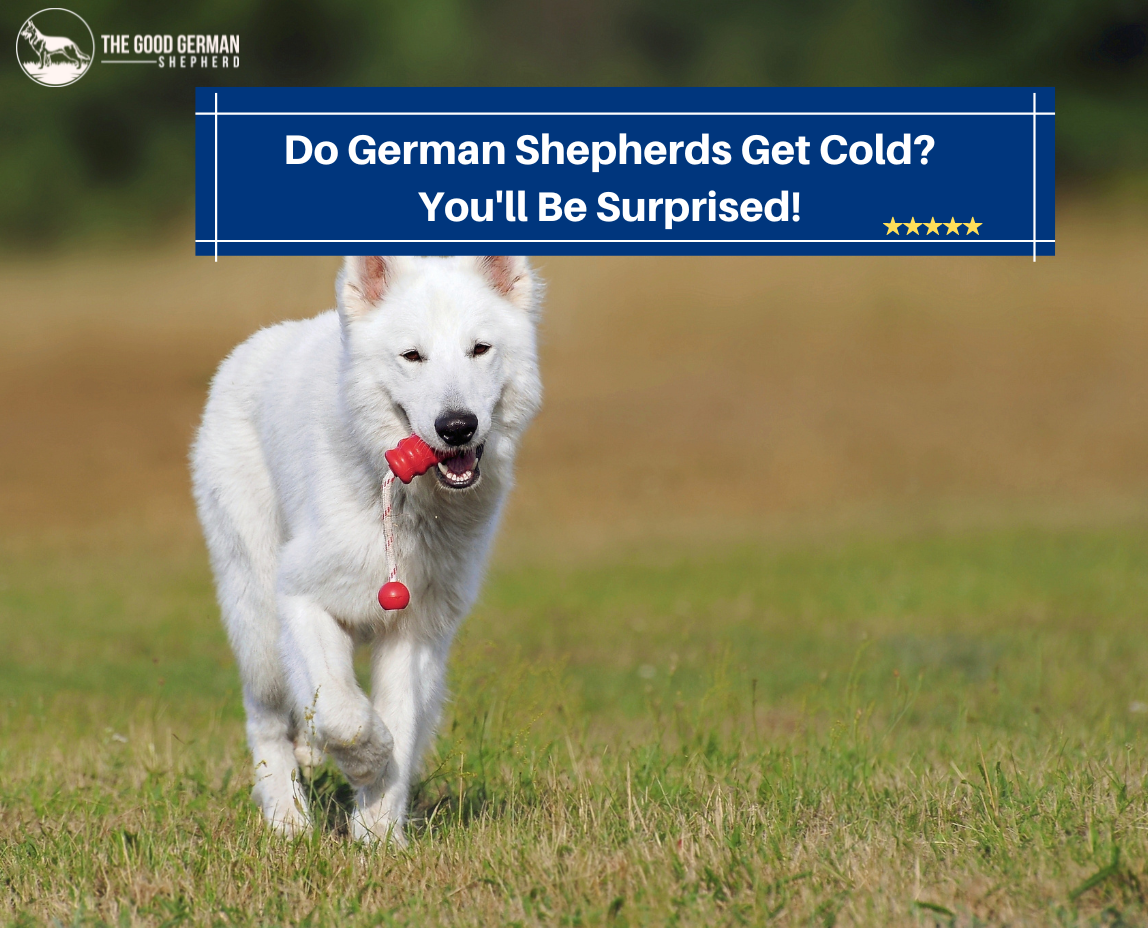You may be familiar with the German Shepherd’s history. The GSD was first bred in Germany in the 1800s, and these dogs have been used for herding and protection in the years that have followed. But do German Shepherds get cold?
Your GSD will likely want to spend a lot of time outdoors, so you may be curious as to how well your dog can withstand cooler weather. Well, the answer may surprise you! Read on to learn more about how the German Shepherd tolerates cold – and hot – weather!
Other articles you will also like: How Much Do German Shepherds Sleep? and Must-Have Essentials for Your German Shepherd Puppy
Contents
German Shepherds: A Brief History

Whether you have a German Shepherd or are considering adopting one into your family, you may be curious about the breed’s origins. Learning more about your dog’s history can help you better care for him and tend to his needs.
Well, as we mentioned, the German Shepherd was originally bred as a sheepdog. Germany’s winter weather is nothing to bark at! You’ll find weather reports of temperatures dropping to as low as -20 degrees Celsius (-4 Fahrenheit), with averages being around 5 degrees Celsius (41 Fahrenheit).
As you may imagine, your GSD’s double coat helps to protect him from cold temperatures, but does that mean he can’t get chilly? We’ll take a look at that a little later in this guide!
Because of the German Shepherd’s ability to learn quickly and take commands from his pack leader, the breed has become a well-recognized work dog. Their intelligence and determination make them extremely popular all over the world.
That popularity has led to the spread of these pups into both hot and cold climates. GSDs are found everywhere from New Zealand to Newfoundland, and they tend to adapt quite well to each climate they find themselves in.
How Do German Shepherds Handle Cold Temperatures?
The German Shepherd isn’t a snow-loving dog like the Husky or Saint Bernard, but you’ll probably find that your pup does enjoy a romp in the white powder! His body and his fur have evolved to protect him against harsh conditions; his thick outer coat helps to repel the moisture from the inclement weather, while his undercoat serves as an insulating layer for your pup.
Your German Shepherd is also predisposed to be very high-energy! This energy, high in comparison with other breeds, is used by his body to keep him warm in cold temperatures.
Finally, your GSD has a fat-to-muscle ratio that supports comfort in cold weather. Their stomachs are a decent distance from the ground, too, further keeping them warm when temps drop. Even your pup’s paws are ready to brave the cold, as their blood vessels warm up blood before returning it to his body!
Now, the fact that your German Shepherd is equipped to handle cooler temperatures doesn’t mean he’s impervious to the cold. In the next section, we’ll look at whether your GSD may be getting a bit too chilly outside.
Do German Shepherds Get Cold?
In a word, yes. German Shepherds do get cold in extreme temperatures. As we’ve discussed, your dog is better ready to handle the frigid New York or Toronto temperatures than some other breeds, but he certainly can’t be out in the cold all day!
If it’s snowing outside, your first instinct will probably be to let your pup play! After all, snow is fun for everyone, especially if you live in an area that doesn’t see the weather very frequently.
It’s okay to let your pup romp for a few but, generally speaking, temperatures of around 4 degrees Celsius are too cold for prolonged play. In these temperatures, you risk your dog suffering from frostbite and hypothermia, two ailments that aren’t always immediately noticeable.
Should you decide to let your dog play outside in temperatures below this mark, keep a close watch. Look for signs of discomfort and bring your dog in if he’s shivering, getting lethargic, or otherwise exhibiting signs that he’s in trouble.
Factors that Affect Your Dog’s Temperature

Your dog may be physically ready to withstand colder temperatures, but there are certain factors that will impact your dog’s comfort. Your dog may get too cold if he:
- Gets damp. Moisture from the air or from melted snow (or rain) can affect your dog’s ability to keep warm. Despite his water-repellent outer coat, your pup risks hypothermia if he gets too damp.
- Is old. Older dogs are more susceptible to harm in cold weather. Monitor your puppies and your seniors closely if they’re playing outside in cold weather.
- Is young. Just as older dogs may not be able to handle the cold, your puppy will need a shorter outdoor playtime in the cooler weather.
- Is sick. Illness can impact your pup’s ability to keep himself warm, so if your dog is sick it’s best to limit his outdoor playtime.
- Is exposed to wind. As you already know, the wind chill can affect the way the temperature feels.
- Has a sparse coat. Whether it’s natural or due to mange or another condition, a sparse coat can cause your German Shepherd to lose his resistance to cold.
German Shepherds and Cold: At Home and Outdoors
Whether you live in a colder climate or your area just sees cool temperatures from time to time, it’s important that you recognize signs of cold in your dog. You’ll want to know when it’s okay to play outside and when it’s time to head indoors!
You’ll be able to tell if your pup is too cold if he is shivering or lethargic. He may show signs of agitation; for example, he may begin to bark or whine. If your dog’s lips are turning blue, he’s probably too cold!
You know that humans get goosebumps when they’re cold. But did you know that your German Shepherd can, too? If you notice that the hairs along his backbone appear to be standing straight up, your pup is probably getting too cold!
Finally, a German Shepherd is a high-energy dog and will probably run around with the zoomies if the temps are cool. If he begins to try to curl up, he’s instinctively conserving warmth and energy, and that’s a sign that he’s too cold.
Recognizing Hypothermia in Your German Shepherd
Like humans, dogs can become hypothermic, which answers the question as to why German Shepherds get cold. Hypothermia is a condition in which your pup’s body temperature will drop well below what is considered normal.
Hypothermia can be fatal, so it’s important that you recognize the signs! If your dog is in distress, you’ll need to bring him inside and warm him up immediately. We’ll talk about how to care for your hypothermic dog in just a moment.
First, observe your dog’s skin. If the color is changing – turning pale or blue – he is getting dangerously cold. Muscle stiffness, a tucked tail, and lethargy are also signs of hypothermia, and shivering is a clear indication that your pup is too cold!
Once you get your dog to a warmer place, look for signs of low blood pressure and shallow breathing. If you notice these symptoms, it’s not necessarily critical that you call a vet, but you can certainly do so.
Your first course of action should be to wrap a hot water bottle in a towel and nestle it against your dog. Don’t have a hot water bottle? No worries – fill a tube sock with rice, tie the end, and microwave it for a
moment.
Give your dog a bit of time to warm up, but observe him all the while. If he’s still having difficulty breathing, or if his temperature isn’t rising, call the veterinarian for emergency treatment.
If your dog loves to play outside no matter the weather, you probably have questions about how to care for him and keep him warm! Here are some answers to the most frequently asked questions about whether German Shepherds get cold.
Do German Shepherds Need Blankets?
Maybe! Just as you love snuggling under a warm blanket after you come indoors, your pup will appreciate the coziness, too! Have a few blankets dedicated to your German Shepherd so that you’re not sharing hairs. Place them in a “nest” on his dog bed when he comes in from the cold.
What is Hypothermia in Dogs
A dog’s normal body temperature ranges from around 101 to 102.5 degrees Fahrenheit. If you take your pup’s temperature and find that it’s dropped below 100 degrees, he may be in trouble.
Keep him warm and dry, and check his temperature frequently. Resist the temptation to give your dog a warm bath, as the moisture when he gets out can exacerbate the problem!
In worst-case scenarios, you may need to get in touch with your vet for further guidance. IVs or other measures may be necessary to bring your pup’s temperature back up to normal.
Can German Shepherds sleep outside in winter?
No responsible dog owner should allow their German Shepherd to sleep outside in winter. Please provide your family member with a place to sleep – indoors – at night. Even the spring, summer, and autumn nights can get too cold for your dog, so it’s a good idea to have a dedicated space for your dog within your home.
If you happen to be displaced or camping, keep your dog warm in the same way you’ll keep yourself warm. Blankets, a shelter, and even a plastic crate with blankets draped over it will be helpful. If you choose the latter method, be sure to allow for air circulation into the crate or kennel.
Do German Shepherds need a winter coat?
We’ve seen instances where pet parents bundle their furry friends up to do their business or take a walk. If you feel that your dog needs a winter coat then by all means research your options!
In a pinch, if it’s especially cold outside, you can use a large human jacket when you let your dog out to use the bathroom. Your dog may or may not appreciate this, but it’s cute to look at and will help keep your pup comfy in the great outdoors. You might even find that your neighbors steal the idea!
Can my house get too cold for my dog?
If you’re comfortable, your dog is probably comfortable. In fact, home temperatures that may seem a little chilly to you are probably just fine for your dog.
The temperature in your home is very unlikely to get too cold for your dog, but if you’re concerned you can give your pup a few blankets. Hot water bottles wrapped in towels can also be effective in keeping his space warm.
Can my house get too cold for my dog?
If you’re comfortable, your dog is probably comfortable. In fact, home temperatures that may seem a little chilly to you are probably just fine for your dog.
The temperature in your home is very unlikely to get too cold for your dog, but if you’re concerned you can give your pup a few blankets. Hot water bottles wrapped in towels can also be effective in keeping his space warm.
Conclusion For “Do German Shepherds Get Cold”
This answers the question, do German Shepherds get cold? Your German Shepherd was blessed with a thick double coat that has evolved to repel water and keep your pup comfortable in cooler temperatures. However, it’s possible for your German Shepherd to get too cold outside, particularly in temperatures that drop below around 40 degrees Fahrenheit.
If you’d like to let your dog play in the snow, there are signs of stress to look out for. A change in skin color, a change in energy levels, and general discomfort are indications that it’s time for your dog to come in!
With that said, it’s an excellent idea to let your GSD work out some energy outdoors, even in cooler weather. Healthy adult dogs will handle this just fine.
